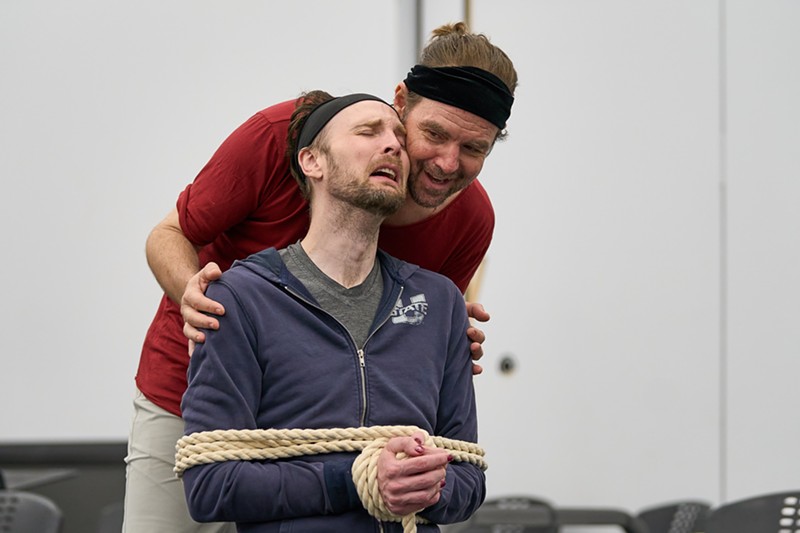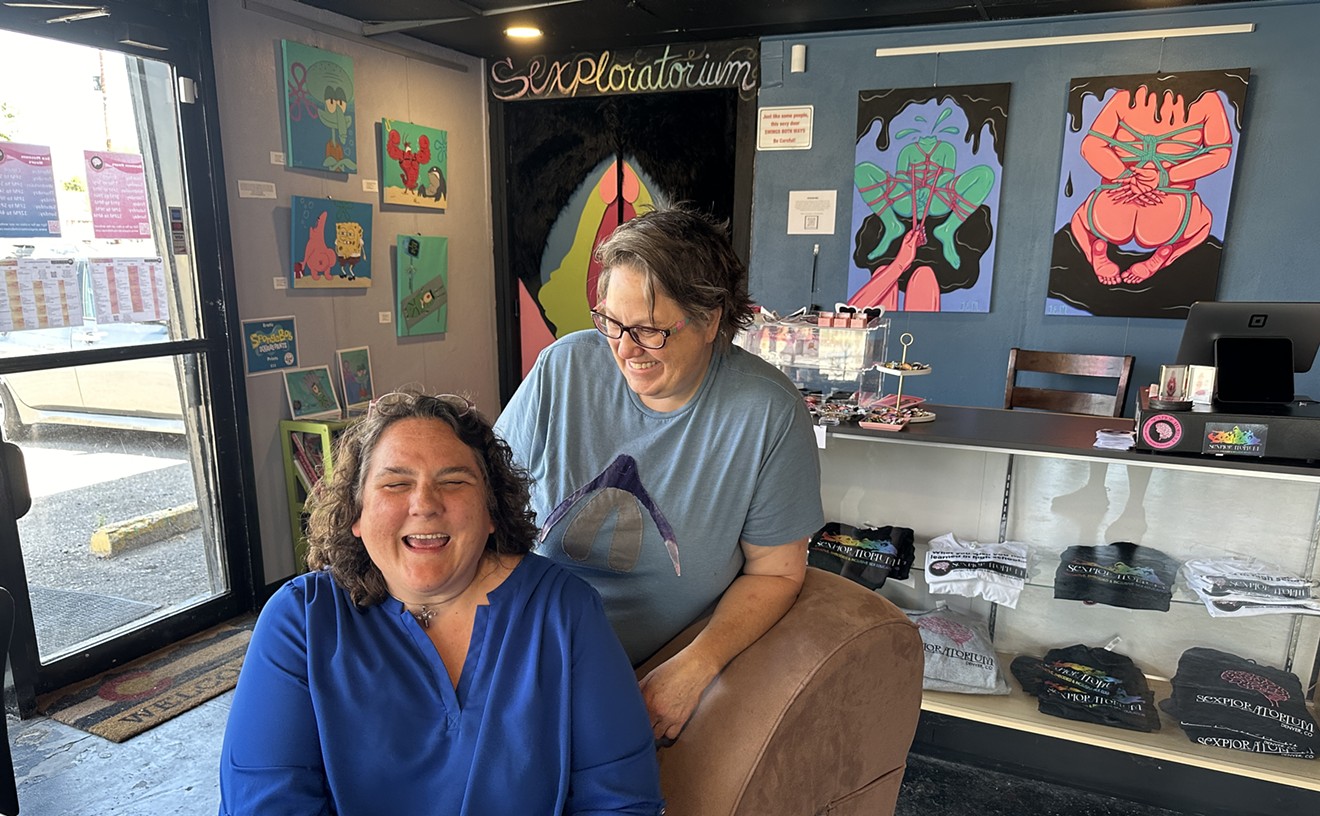Forget the capes, fangs and creepy castle walls. Dracula: A Feminist Revenge Fantasy, Really, which opens at the Arvada Center's Black Box Theatre on Friday, September 27, reimagines your favorite bloodsucker with biting comedy rather than gothic gloom.
"I was drawn to it because of its humor, which is completely irreverent and unlike the typical Dracula," says director Carolyn Howarth. "All the bits and pieces of the classic Dracula story are there — we still have the characters, lots of biting, horror and bloodsucking, but it's far wittier, more sarcastic and surprising. Playwright Kate Hamill took the classic story and added pop-culture references, such as Buffy the Vampire Slayer, Interview With a Vampire and a slew of horror tropes, to create a play that is both scary and funny."
Adapted from Bram Stoker's 1897 novel Dracula, Hamill's story takes the familiar characters, settings and savage themes of Stoker’s novel and reframes them for a modern audience. The result is a "rollicking romp with a lot of heart," Howarth says, which also includes fierce critiques of power, gender dynamics and the nature of predators.
The plot follows the broad strokes of the original book. Jonathan Harker (Lance Rasmussen) is a lawyer who travels to Romania to help Count Dracula (Geoffrey Kent) purchase property in England, leaving behind his pregnant wife, Mina (Annie Barbour). Rather than wait at home, Mina visits friend Lucy Westenra (Noelia Antweiler) in the seaside town of Whitby, where Lucy’s fiancé, Dr. George Seward (Gareth Saxe), runs a nearby lunatic asylum.
Things take a turn when Harker becomes trapped in Dracula’s castle and falls victim to the vampire’s influence. Dracula soon follows Harker’s trail to England, where he preys on Lucy, who grows increasingly ill. As Lucy’s condition deteriorates, Dr. Seward calls in his colleague, Dr. Van Helsing (Prentiss Benjamin), an expert in unusual diseases. Van Helsing quickly identifies Lucy’s affliction and leads the charge to stop Dracula, enlisting the help of Mina, Seward and quirky asylum patient Renfield (Jessica Austgen).
In Hamill's version, Van Helsing and Renfield are gender-swapped; there are two female vampires, Marilla (Katrina Stelk) and Drusilla (Mel Schaffer); and the women in the story are not victims. Mina transforms from the passive figure of the original novel to a force to be reckoned with, taking command as the group approaches Dracula. Lucy, too, gains depth as her illness emphasizes the conflict between society's expectations of women and their suppressed desires.
"What I am really enjoying is the contrast between who she is as a Victorian woman and the monster that hides within," says Noelia Antweiler, who plays Lucy. "We have talked a little bit about how these vampires are the ultimate expression of people's less desirable tendencies. Lucy is having some marital anxieties. She worries about whether she is making the right choice with Dr. Seward, but she's very aware of how marriage can affect her life and wants to be a stable, respectable woman. But when she transforms, she becomes this spidery, sexual, evil, creepy villain, and it is delicious."
Annie Barbour, who plays Mina Harker, is no stranger to Hamill's literary adaptations. Earlier this year, Barbour starred in Emma with the Denver Center for the Performing Arts Theatre Company as Jane Fairfax and Mrs. Bates; she had the chance to work closely with Hamill during early table work and preview performances.
"It was super fun to work with Kate a little bit in the room," Barbour says. "The math of comedy that she writes is so specific and brilliant. It was a great little peek into her brain."
That experience came in handy as Barbour approached Mina's transformation in this production: She's no longer the quiet, reserved character of the original novel.
“In this version, Mina is going off on the adventure of hunting down the vampires," Barbour says. "She is reluctant at first because, in Kate Hamill's adaptation, she is also pregnant. The passive innocence of Mina, which appears in most adaptations, is reinterpreted as the quiet strength of becoming a woman through motherhood. She argues with those who tell her to be quiet, stands up for herself, and is so invested in the people in her life who are being hurt, whether Lucy or her husband, that she is willing to defend them at all times."
Prentiss Benjamin, who plays the iconic role of Van Helsing, has a personal connection to her role. Her father, actor Richard Benjamin, played Van Helsing in the 1979 comedy film Love at First Bite. "It’s a very silly movie, and I found it hysterical as a kid," Benjamin says. "We joked after I was cast that there aren’t too many father-daughters who have both played Van Helsing."
One of this production's challenges is finding the delicate balance between humor and horror, something that Howarth and her cast have embraced during rehearsals. “It’s really difficult to balance scary and funny,” Howarth says. “At the heart of any play, you have to find the truth of it. We’re trying to find the core, the gore, and land the jokes. If we do those three things, the audience will laugh, jump and then think about the deeper themes on the way home."
For Geoffrey Kent, stepping into the role of Dracula is an opportunity to explore a different type of villain; this is the first time he's played a "non-human, superpowered character," he says. His performance was inspired by Tom Hiddleston's portrayal of Loki, whom he describes as able to be funny while remaining menacing.
“In this play, Dracula gets to share in the comedy," Kent says. "Most Draculas don't really drive the humor of the piece; Renfield in other Dracula adaptations gets the comedy, so it's nice that we all equally share the comedy. I get to be petulant, pout and have temper tantrums to comic effect. The number-one rule of comedy is that it’s still a tragedy to your character. Your role as an actor is to elevate the situation so that the audience can laugh at your tragedies."
Not only do the characters drive the humor and subvert expectations, but the play's structure and design elements also work to surprise audiences. To keep the visuals fresh, the Arvada Center production incorporates Victorian and modern aesthetics.
“I’m guessing most people are expecting to see drippy gray castle walls, and that is not what they are going to experience," Howarth says. "I don't know if I want to give that away, but it's not purely Victorian. It's a bit more modern, so don't expect to see anything like Bela Lugosi in a coffin."
At its heart, Dracula: A Feminist Revenge Fantasy, Really, is, as the title suggests, a story of revenge — specifically, revenge against the societal structures that have oppressed women for centuries. Hamill’s adaptation leans into the idea that the fight against Dracula is not just a battle against a supernatural monster, but a stand against the ultimate symbol of patriarchal dominance.
“Dracula in this play is a misogynistic alpha male,” Kent explains. “He’s the ultimate obstacle for women to overcome, and they can only do that through great cost and strength.”
Howarth sees the play as more than just a piece of entertainment — it’s a reflection of the world we live in. “I think what the playwright is trying to do with this piece is shed light on the patriarchy and women’s place in society as it’s been for thousands of years,” she says. “The women in this play are empowered to make choices for themselves and step up to fight. But in this world of misogyny, everyone has blood on their hands by the end of the story.”
With its blend of horror, humor and feminist fire, Dracula: A Feminist Revenge Fantasy, Really, is a refreshing take on a familiar tale that's tailored for people searching for something a little different this spooky season.
“This production is a great Halloween show, but it’s also a great gateway drug to theater for people who might not see a lot of live performances,” says Antweiler. "Sometimes I struggle with Shakespeare because I want people to come, but I know the word 'Shakespeare' makes people nervous because they think they will not understand it. This is very timely, easy to understand and really fun. If you're kind of a newbie to the theater, this is a really great production to see."
Dracula: A Feminist Revenge Fantasy, Really, Friday, September 27, through Sunday, November 3 at the Arvada Center for the Arts and Humanities, 6901 Wadsworth Boulevard. Learn more at arvadacenter.org.
"I was drawn to it because of its humor, which is completely irreverent and unlike the typical Dracula," says director Carolyn Howarth. "All the bits and pieces of the classic Dracula story are there — we still have the characters, lots of biting, horror and bloodsucking, but it's far wittier, more sarcastic and surprising. Playwright Kate Hamill took the classic story and added pop-culture references, such as Buffy the Vampire Slayer, Interview With a Vampire and a slew of horror tropes, to create a play that is both scary and funny."
Adapted from Bram Stoker's 1897 novel Dracula, Hamill's story takes the familiar characters, settings and savage themes of Stoker’s novel and reframes them for a modern audience. The result is a "rollicking romp with a lot of heart," Howarth says, which also includes fierce critiques of power, gender dynamics and the nature of predators.
The plot follows the broad strokes of the original book. Jonathan Harker (Lance Rasmussen) is a lawyer who travels to Romania to help Count Dracula (Geoffrey Kent) purchase property in England, leaving behind his pregnant wife, Mina (Annie Barbour). Rather than wait at home, Mina visits friend Lucy Westenra (Noelia Antweiler) in the seaside town of Whitby, where Lucy’s fiancé, Dr. George Seward (Gareth Saxe), runs a nearby lunatic asylum.
Things take a turn when Harker becomes trapped in Dracula’s castle and falls victim to the vampire’s influence. Dracula soon follows Harker’s trail to England, where he preys on Lucy, who grows increasingly ill. As Lucy’s condition deteriorates, Dr. Seward calls in his colleague, Dr. Van Helsing (Prentiss Benjamin), an expert in unusual diseases. Van Helsing quickly identifies Lucy’s affliction and leads the charge to stop Dracula, enlisting the help of Mina, Seward and quirky asylum patient Renfield (Jessica Austgen).
In Hamill's version, Van Helsing and Renfield are gender-swapped; there are two female vampires, Marilla (Katrina Stelk) and Drusilla (Mel Schaffer); and the women in the story are not victims. Mina transforms from the passive figure of the original novel to a force to be reckoned with, taking command as the group approaches Dracula. Lucy, too, gains depth as her illness emphasizes the conflict between society's expectations of women and their suppressed desires.
"What I am really enjoying is the contrast between who she is as a Victorian woman and the monster that hides within," says Noelia Antweiler, who plays Lucy. "We have talked a little bit about how these vampires are the ultimate expression of people's less desirable tendencies. Lucy is having some marital anxieties. She worries about whether she is making the right choice with Dr. Seward, but she's very aware of how marriage can affect her life and wants to be a stable, respectable woman. But when she transforms, she becomes this spidery, sexual, evil, creepy villain, and it is delicious."
Annie Barbour, who plays Mina Harker, is no stranger to Hamill's literary adaptations. Earlier this year, Barbour starred in Emma with the Denver Center for the Performing Arts Theatre Company as Jane Fairfax and Mrs. Bates; she had the chance to work closely with Hamill during early table work and preview performances.
"It was super fun to work with Kate a little bit in the room," Barbour says. "The math of comedy that she writes is so specific and brilliant. It was a great little peek into her brain."
That experience came in handy as Barbour approached Mina's transformation in this production: She's no longer the quiet, reserved character of the original novel.
“In this version, Mina is going off on the adventure of hunting down the vampires," Barbour says. "She is reluctant at first because, in Kate Hamill's adaptation, she is also pregnant. The passive innocence of Mina, which appears in most adaptations, is reinterpreted as the quiet strength of becoming a woman through motherhood. She argues with those who tell her to be quiet, stands up for herself, and is so invested in the people in her life who are being hurt, whether Lucy or her husband, that she is willing to defend them at all times."
Prentiss Benjamin, who plays the iconic role of Van Helsing, has a personal connection to her role. Her father, actor Richard Benjamin, played Van Helsing in the 1979 comedy film Love at First Bite. "It’s a very silly movie, and I found it hysterical as a kid," Benjamin says. "We joked after I was cast that there aren’t too many father-daughters who have both played Van Helsing."
One of this production's challenges is finding the delicate balance between humor and horror, something that Howarth and her cast have embraced during rehearsals. “It’s really difficult to balance scary and funny,” Howarth says. “At the heart of any play, you have to find the truth of it. We’re trying to find the core, the gore, and land the jokes. If we do those three things, the audience will laugh, jump and then think about the deeper themes on the way home."
For Geoffrey Kent, stepping into the role of Dracula is an opportunity to explore a different type of villain; this is the first time he's played a "non-human, superpowered character," he says. His performance was inspired by Tom Hiddleston's portrayal of Loki, whom he describes as able to be funny while remaining menacing.
“In this play, Dracula gets to share in the comedy," Kent says. "Most Draculas don't really drive the humor of the piece; Renfield in other Dracula adaptations gets the comedy, so it's nice that we all equally share the comedy. I get to be petulant, pout and have temper tantrums to comic effect. The number-one rule of comedy is that it’s still a tragedy to your character. Your role as an actor is to elevate the situation so that the audience can laugh at your tragedies."
Not only do the characters drive the humor and subvert expectations, but the play's structure and design elements also work to surprise audiences. To keep the visuals fresh, the Arvada Center production incorporates Victorian and modern aesthetics.
“I’m guessing most people are expecting to see drippy gray castle walls, and that is not what they are going to experience," Howarth says. "I don't know if I want to give that away, but it's not purely Victorian. It's a bit more modern, so don't expect to see anything like Bela Lugosi in a coffin."
At its heart, Dracula: A Feminist Revenge Fantasy, Really, is, as the title suggests, a story of revenge — specifically, revenge against the societal structures that have oppressed women for centuries. Hamill’s adaptation leans into the idea that the fight against Dracula is not just a battle against a supernatural monster, but a stand against the ultimate symbol of patriarchal dominance.
“Dracula in this play is a misogynistic alpha male,” Kent explains. “He’s the ultimate obstacle for women to overcome, and they can only do that through great cost and strength.”
Howarth sees the play as more than just a piece of entertainment — it’s a reflection of the world we live in. “I think what the playwright is trying to do with this piece is shed light on the patriarchy and women’s place in society as it’s been for thousands of years,” she says. “The women in this play are empowered to make choices for themselves and step up to fight. But in this world of misogyny, everyone has blood on their hands by the end of the story.”
With its blend of horror, humor and feminist fire, Dracula: A Feminist Revenge Fantasy, Really, is a refreshing take on a familiar tale that's tailored for people searching for something a little different this spooky season.
“This production is a great Halloween show, but it’s also a great gateway drug to theater for people who might not see a lot of live performances,” says Antweiler. "Sometimes I struggle with Shakespeare because I want people to come, but I know the word 'Shakespeare' makes people nervous because they think they will not understand it. This is very timely, easy to understand and really fun. If you're kind of a newbie to the theater, this is a really great production to see."
Dracula: A Feminist Revenge Fantasy, Really, Friday, September 27, through Sunday, November 3 at the Arvada Center for the Arts and Humanities, 6901 Wadsworth Boulevard. Learn more at arvadacenter.org.












